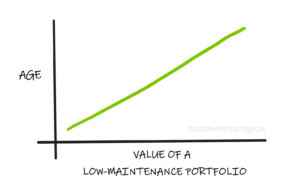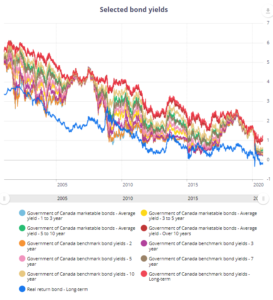Two days ago the S&P 500 dropped 800 points – almost 3% (the S&P/TSX Composite Index was “only” down about 2%). The next morning, I found an email in my inbox from David Stanley with this article attached. If anyone can put this volatility in perspective for the DIY investor, it’s Dave. Read on for some sage words from one who has seen the resilience of a dividend-based strategy through all kinds of markets.
Matt
This is a reprise (with a few minor alterations) of a column I wrote in 2000 at the beginning of the dot.com bubble deflation. It seems as appropriate now as it did then.
“As I write this, on a rainy April Friday afternoon in Florida, the muted television is showing pictures of market mayhem; all the major indices are down sharply, and have been for several days. The television is muted because I can see a glut of pendants parading on the screen and I have no interest in their often self-serving reasons why stocks will either continue to fall, rally, or move sideways for the next short period of time. Rather, the thought that goes through my head is, “Gee, I am glad I am an individual investor and not a professional money manager.”
Think for a moment what those unfortunate men and women have to go through managing other people’s money, how the end of each quarter must loom ahead like some gigantic rocky shore just waiting for a sub-par report to send them crashing on the boulders. Well, perhaps that is a little over-dramatic, but it is certainly a job that I wouldn’t want to have. I believe I have done reasonably well managing my own small portfolio but I have never been able to take the advice given to me by many to simply ignore my investments and only check them every month or so. Rarely does a day go by when I don’t look in on the value of my stocks; for me, it is like checking the ball scores – just because my favorite team didn’t win that day doesn’t mean I will switch allegiances.
It has always seemed a good idea to select a range of high-quality stocks and hold them for a very long time so that, in the event of a short-term problem with one company or one sector, others will continue to advance. But what should one do in the face of an over-all market rout? Is this the time to switch into bonds? Should I sell my holdings? As I have written before, the cost of asset reallocation is hefty and not to be taken lightly; capital gains taxes alone are formidable. No, for me, the answer lies in leaving the money I know I won’t need for several years at the mercy of the stock market. DRIP plans, in fact a form of dollar cost averaging, mean that I am always purchasing more shares of my favorites, in good times and in bad.
Does this philosophy exclude profit taking? My view is that profit taking should be set by, as one limit, how much capital gains taxes you are willing to pay and at the other by your comfort level. Thus, if you need to pare away 20% of your profits to sleep well, that is what you must do, and pay taxes accordingly.
It is interesting to compare this rather simple approach to that used by most money managers. Almost by definition, they are required to focus their attentions on a much shorter time period. Turnover rates, the percentage of buy or sells in their holdings, often exceed 100% in a year, which is a very expensive situation. Short-term gainers rather than long-term investments appear to be the goal. Yet, most often, they under-perform the market indices they are attempting to best. As the 2018 SPIVA Scorecard concluded:
“. . . More than 75% of Canadian active equity
managers underperformed their benchmarks across all categories
in 2018.”
And, let us not forget the costs associated with having someone else managing your money. It continues to astound me that otherwise intelligent individuals turn their investment decisions over to someone who can’t possibly know as much about their goals and limitations as they do, especially in light of the overwhelming independent investment information now available. Can it be that some people just need someone else to blame if things go wrong? I hope that is not the case.
My overall theme is that even when the stock markets appear to be totally divorced from any reality, I much prefer to be an individual investor rather than trust my finances to someone whose investment philosophy is so radically different than my own.”
As always, I hope this post will generate discussion and I will attempt to answer your questions within the comments section.





Sound logic Mr Stanley that many of us don’t heed! I consider myself a so called sophisticated investor of 20 years that trades naked index options 2 or 3 months out but still hang on to some straight equity stinkers that at one time we’re the flavour of the day and now thinking they will recover. Positions like JE “Just Energy” that just keeps sinking! That said, I do have a part of my holdings in both the BTSX and the classic couch potato portfolios. It is interesting to see the precious metals and bond funds somewhat counteracted the recent fall in equities this past week or so in the couch potato portfolio.
Thank you for the post. It is always good to be reassured that we on the right track.
I’m popping in here to give a public ‘thank you’ to David Stanley.
When my wife and I decided to manage our own financial portfolio we pursued knowledge about investing. We made some mistakes, had some success but it wasn’t until we joined a share club where David Stanley helped people understand the basic fundamentals of dividend investing that things really took off for us.
Thank you David for giving your time to educate regular people like us. You helped us to gain confidence in managing our own investments. We are now getting solid results.
David helped us to learn how to pick good companies to invest in. This helped us to become steady and not moved by all the drama associated with the media coverage of the financial industry.